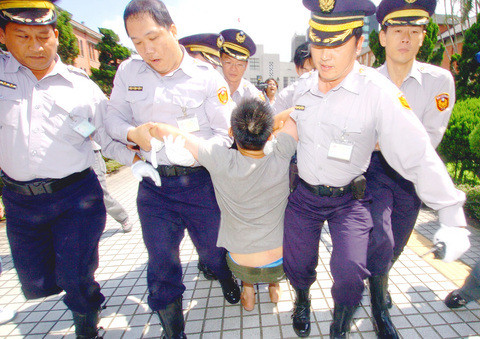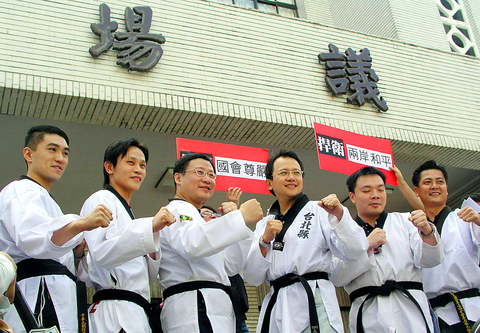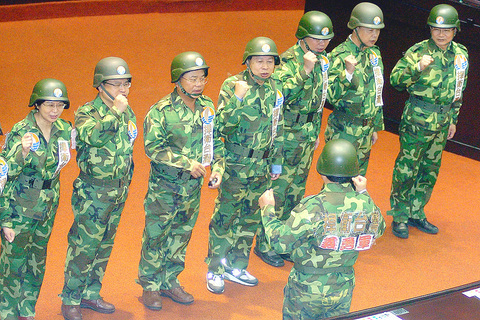The governing party went on the offensive against an opposition bill which would enshrine the "one China" principle as part of Taiwanese law and would establish a partisan committee to conduct relations with China, effectively cutting out the executive branch from cross-strait relations.
Democratic Progressive Party (DPP) Chairman Su Tseng-chang (
Su made the remarks after violent battles in the Legislative Yuan yesterday over the proposed national communications commission (NCC) bill, which is designed to set up a media watchdog agency.

PHOTO: LO TEH-PEI, TAIPEI TIMES
Su said that the pan-blue camp's leaders had neglected the nation's outcry against China's "Anti-Secession" Law, which Beijing passed in March.
The visits to China by these pan-blue camp leaders helped China to relieve international pressure and denunciation from the international community following the enactment of the Anti-Secession Law, Su said.
Half a year later, the pan-blue camp is proposing the cross-strait peace advancement bill, which echoes the Anti-Secession Law, Su said. He added that if the law was passed, it would definitely undermine the peace in the Taiwan Strait and endanger Taiwan's sovereignty and democracy.

PHOTO: CNA
"Therefore, the DPP has to show our stern opposition to the [peace advancement] bill using three points on behalf of 23 million people of Taiwan," Su said, speaking before the party's weekly central standing committee meeting yesterday afternoon.
First, the pan-blue camp's bill is a "surrender bill," because it attempts to legalize the "one China" principle and the so-called "1992 consensus," turning them into domestic law, which would blur the government's legitimacy and negate Taiwan's sovereignty, Su said.
Second, if the bill is passed, any statement or action that opposes the "one China" principle will become illegal, thus restricting the hard-earned freedom of the people of Taiwan.

PHOTO: LIAO CHENG-HUI, TAIPEI TIMES
Third, if the pan-blue camp does take advantage of its majority and forces passage of the bill, then the president's power to conduct national defense and diplomacy will be usurped, thus sabotaging the constitutional system, Su said.
"The DPP will try to stop the pan-blue camp from exploiting its majority to attain its endless political blackmail of the people of Taiwan," Su said.
Su also blasted the proposed NCC bill.
"The pan-blue camp ignores the fact that the NCC committee members are supposed to be neutral and independent, and they are insisting that committee members should be appointed according to the seats in each political party," Su said.
"It will introduce political confrontation into an independent organization, and thus political parties will be able to control the mass media," Su said. "If this happens, the reform of the mass media will never succeed."

The High Prosecutors’ Office yesterday withdrew an appeal against the acquittal of a former bank manager 22 years after his death, marking Taiwan’s first instance of prosecutors rendering posthumous justice to a wrongfully convicted defendant. Chu Ching-en (諸慶恩) — formerly a manager at the Taipei branch of BNP Paribas — was in 1999 accused by Weng Mao-chung (翁茂鍾), then-president of Chia Her Industrial Co, of forging a request for a fixed deposit of US$10 million by I-Hwa Industrial Co, a subsidiary of Chia Her, which was used as collateral. Chu was ruled not guilty in the first trial, but was found guilty

DEADLOCK: As the commission is unable to forum a quorum to review license renewal applications, the channel operators are not at fault and can air past their license date The National Communications Commission (NCC) yesterday said that the Public Television Service (PTS) and 36 other television and radio broadcasters could continue airing, despite the commission’s inability to meet a quorum to review their license renewal applications. The licenses of PTS and the other channels are set to expire between this month and June. The National Communications Commission Organization Act (國家通訊傳播委員會組織法) stipulates that the commission must meet the mandated quorum of four to hold a valid meeting. The seven-member commission currently has only three commissioners. “We have informed the channel operators of the progress we have made in reviewing their license renewal applications, and

‘DENIAL DEFENSE’: The US would increase its military presence with uncrewed ships, and submarines, while boosting defense in the Indo-Pacific, a Pete Hegseth memo said The US is reorienting its military strategy to focus primarily on deterring a potential Chinese invasion of Taiwan, a memo signed by US Secretary of Defense Pete Hegseth showed. The memo also called on Taiwan to increase its defense spending. The document, known as the “Interim National Defense Strategic Guidance,” was distributed this month and detailed the national defense plans of US President Donald Trump’s administration, an article in the Washington Post said on Saturday. It outlines how the US can prepare for a potential war with China and defend itself from threats in the “near abroad,” including Greenland and the Panama

Taiwan People’s Party (TPP) Chairman Huang Kuo-chang (黃國昌) yesterday appealed to the authorities to release former Taipei mayor Ko Wen-je (柯文哲) from pretrial detention amid conflicting reports about his health. The TPP at a news conference on Thursday said that Ko should be released to a hospital for treatment, adding that he has blood in his urine and had spells of pain and nausea followed by vomiting over the past three months. Hsieh Yen-yau (謝炎堯), a retired professor of internal medicine and Ko’s former teacher, said that Ko’s symptoms aligned with gallstones, kidney inflammation and potentially dangerous heart conditions. Ko, charged with